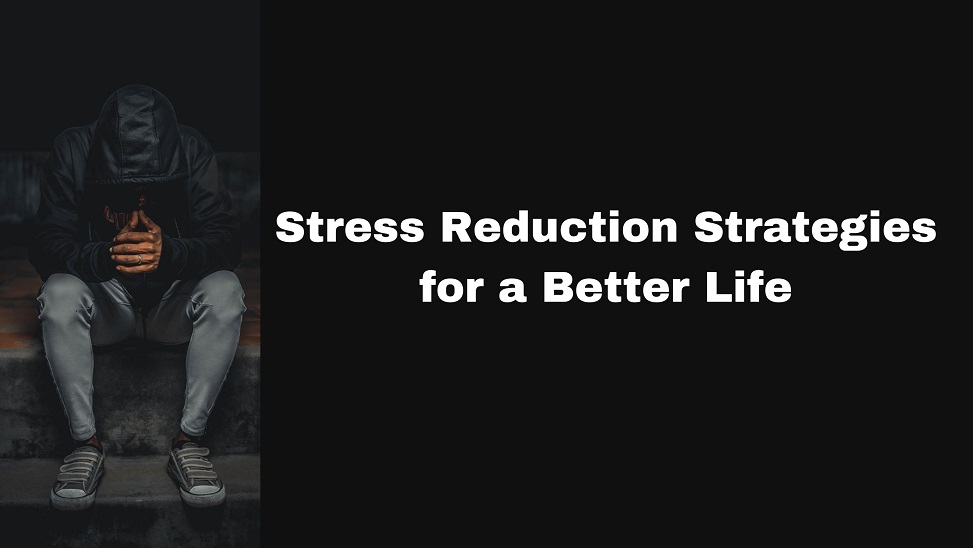Stress Reduction Strategies for a Better Life
Know the Stress Reduction Strategies – Stress has become a near-ubiquitous companion in a world filled with constant demands and challenges.
While stress is a natural response to the ups and downs of life, its continuous presence can take toll on our physical, mental & emotional well-being.
The good news is that there are effective strategies to reduce and manage stress, ultimately leading to a better and more fulfilling life.
This article presents a comprehensive collection of stress reduction techniques to help you regain control and achieve balance and tranquility.
Practice Mindfulness and Meditation
Mindfulness involves being fully present at the moment and observing your thoughts without judgment. Meditation, on the other hand, encourages focused attention and relaxation.
Regular mindfulness and meditation practice can help you manage stress by fostering a sense of calm and enhancing your ability to respond to challenges more clearly.
Engage in Physical Activity
Exercise is a natural stress reliever. Regular physical activity releases endorphins, the body’s “feel-good” chemicals, which help alleviate stress and improve mood.
Whether it’s a brisk walk, a yoga session, or a workout at the gym, finding an activity you enjoy can significantly reduce stress.
Prioritize Healthy Nutrition
Eating a balanced diet is essential for stress management. Nutrient-rich foods like vegetables, whole grains, fruits, lean proteins & healthy fats provide your body with the necessary resources to combat stress.
Avoid excessive caffeine and sugar, which can contribute to energy crashes and mood swings.
Ensure Quality Sleep
Adequate sleep is fundamental to stress reduction. Establish a regular sleep routine can create a comfortable sleep environment, and prioritize getting 7-9 hours of restful sleep each night.
Proper sleep rejuvenates your body and mind, enhancing your ability to cope with stress.
Practice the Deep Breathing and Relaxation Techniques
Deep breathing exercises & relaxation techniques can quickly alleviate stress. Try diaphragmatic breathing – inhale deeply through your nose, allowing your abdomen to rise, and exhale slowly through your mouth.
Progressive muscle relaxation involves tensing & then releasing different muscle groups, promoting relaxation.
Limit Technology and Screen Time
Constant exposure to screens & digital devices can contribute to stress and anxiety. Set boundaries for your technology use, especially before bedtime, to create a space for relaxation and disconnection from the digital world.
Cultivate Social Connections
Strong social connections provide emotional support and a sense of belonging. Spend quality time with family & friends, engage in activities you enjoy, and share your thoughts and feelings to alleviate stress and foster community.
Engage in Creative Hobbies
Creative activities such as painting, writing, gardening, or playing a musical instrument can be therapeutic.
These hobbies allow you to express yourself, focus your mind, and find solace, ultimately helping to reduce stress.
Set Realistic Goals and Prioritize
Break down tasks into the manageable steps and set realistic goals for yourself. Avoid overloading your schedule, you need to learn to say no when necessary. Prioritizing tasks can help you manage stress by preventing overwhelm.
Seek Professional Support
If stress becomes overwhelming, seeking professional help from therapists, counselors, or some support groups can provide valuable tools and techniques for managing stress and improving overall well-being.
Conclusion
Reducing stress is beneficial for your mental and emotional health and contributes to a better and more fulfilling life.
By integrating mindfulness, exercise, healthy nutrition, sleep, relaxation techniques, social connections, hobbies, and effective goal-setting, you can regain control over your stress levels & lead a more balanced and content life.
Remember that stress reduction is a continuous journey, and with dedication and the right strategies, you can create a life marked by resilience, happiness, and well-being.
Thanks for visiting How To Cure Stress

